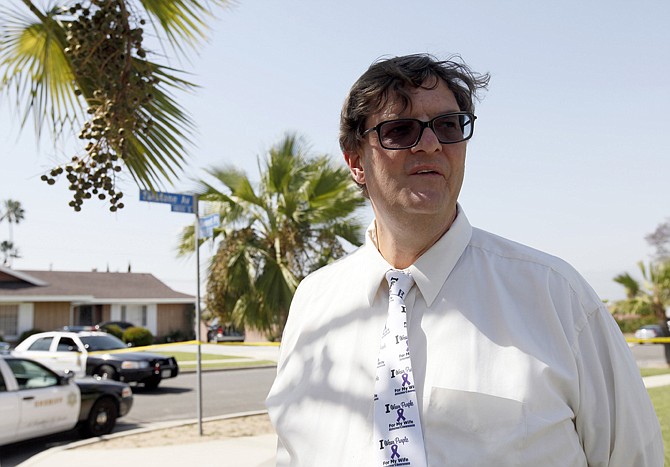HACIENDA HEIGHTS, Calif. (AP) - Every morning, Jim Crabtree said he would wake up, wash and dress his wife who suffered from Alzheimer's disease, and drop her off at his parents' home so he could go to work.
On Wednesday, he did the same, without any sign of trouble. Hours later, his parents and his wife were dead in an apparent murder-suicide.
Los Angeles County sheriff's detectives are trying to determine what happened.
Crabtree identified the three dead as his 80-year-old mother, Carol Crabtree, his 84-year-old father, Dan Crabtree, and his 62-year-old wife, Rita Delehanty.
Crabtree, 55, said all three suffered from chronic illnesses: His wife from mid-stage Alzheimer's, his father from early-stage Alzheimer's, and his mother from debilitating chronic joint pain that forced her to use a wheelchair.
Authorities found the three after a 911 call Wednesday morning brought deputies to the quiet suburban neighborhood in Hacienda Heights.
Sheriff's Lt. Dave Dolson said investigators found the couple and their daughter-in-law with multiple gunshot wounds: Delehanty was dead in the living room, Carol Crabtree's body was in a powered wheelchair in the back bedroom, and Dan Crabtree was barely alive on the backyard porch. A shotgun and handgun were found near him.
Investigators believe Dan Crabtree used a handgun to kill the two women, and then shot himself with both the shotgun and the handgun, Dolson said. Investigators also believe Dan Crabtree called 911, although the caller didn't identify himself. They don't know a motive for the killings.
"There's no indication that anybody else was in the house except the three of them," Dolson said.
Jim Crabtree said he believed their failing health led them to hasten their deaths. "This is the classic ending of three people with terminal illnesses," he said.
Marjorie Bauer was in her house a block away when she heard the blast of a single gunshot shortly before 9 a.m. She has lived in the neighborhood for decades, along with neighbors George and Alice Parrish.
"It's shocking," said Alice Parrish. "You don't expect it in your own backyard."
Residents used to see Carol Crabtree out taking walks, but more recently, she was rarely seen. "She couldn't walk anymore, she was in a lot of pain," Alice Parrish said.
Bauer said the couple owned a large motorhome they'd take on camping trips, and recently strapped Carol Crabtree's wheelchair to the back and headed out on vacation.
"I feel more grief for them then calling it murder," Bauer said. "There ought to be another word ... It was probably just a mercy killing. I advocate for the right to die with dignity, and we don't have that in California."
Though Dan and Carol Crabtree were suffering from poor health, they agreed to care for their son's wife so he could work.
His wife would have breakfast with her in-laws each morning, and Jim Crabtree would go to his job as a registered nurse who trained paramedics for the Los Angeles County Department of Health Services. Later in the day, his parents would drop his wife off at her home about a mile away, and paid caregivers would take care of her until Crabtree returned.
Crabtree said he learned about what happened from a colleague while at work. He spoke outside his parents' home Wednesday about his wife's progressively worsening Alzheimer's over the last seven years. Delehanty had also been a nurse, but she had to stop working five years ago because of her illness. The two had been married 25 years and never had kids, he said.
"My wife didn't know who I was. My wife didn't know we were married," Crabtree said. "You try to help her, she yells, she screams, she hits you."
Crabtree wore a white tie Wednesday with a purple ribbon on it that said "I wear purple for my wife" and pledged Alzheimer's awareness.
"The pain and misery that comes with this dementia, until you lived it, you don't get it," Crabtree said. He said caregivers cost him $2,000 a month and none of it was covered by insurance.
After years of withering emotional drain caring for his wife, he said he was somewhat relieved it was all over. As he had looked into the future, he had wondered how it was going to end.
"When somebody dies, you don't want to go out and say I'm overjoyed my parents and my wife are dead," Crabtree said, "But in some cases, my wife died years ago."

